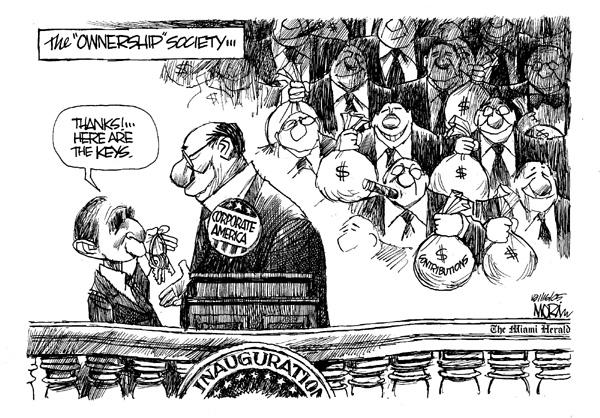Lets face it, the disruptive forces described by Clayton Christensen in "
Disrupting Class,"
this post on Fluid Learning, and the subsequent conversations that have emerged today on
Dean Shareski's blog and
Will Richardson's blog are going to have an effect on our schools. These forces include the internet, personalized learning, and school choice. So far what we have seen play out is as technology and the internet improve the choice to either home school a child or enroll them in an online school has gotten easier; as more charter and magnet schools open they pull students from the enrollment of our traditional schools; and the inflexibility of our schools has led to an increased dropout rate and a growing number of students who see more value in teaching themselves what they think they need to know than seeking a diploma or degree. The result has been lots of either/or scenarios. You are either enrolled in an online class or you are enrolled in a traditional classroom...you either are home schooled or you attend a public or private school...you either are mainstreamed or you are in some kind of alternative program. This approach has spread us thin. All of these approaches either ignore altogether or place bets on the disruptive forces and such a polar choice leaves few good choices in the long run.
What is it, or what was it, about the schools we grew up with that our communities loved? What programs did those schools offer that added identity and built community? I would suspect that for most of us those things were the arts programs, athletic programs, extra curricular activities, clubs, and organizations. These were the things we celebrated and these are the first to go when disruptive innovation is dealt with in a polar fashion. How can we retain what we hold dear about our community schools in the face of disruptive innovation?
Before we can answer that question we need to look at what the disruption really is. The disruption is the internet. The internet is what is behind the flat world that Thomas Friedman talks about and it is the tool that makes the kind of grass-roots social action and semantic restructuring that Clay Shirky describes. The internet is the largest collection of data and information our world has ever seen and it makes information cheap. It also allows for the outsourcing of or automation of tasks that are routine. However, the internet is more than the sum of it's parts because behind each window that looks into this great big machine sits an individual with thoughts, knowledge, and wisdom. It allows for us to connect in ways we never could before not only with data but with each other.
Daniel Pink also addresses this issue by observing that what this disruption is going to call for in the economic world are people who can exercise the right sides of their brains, see the whole picture, and be creative. The polar approach we have been taking in response to this disruption has forced schools to cut back on programs that typically best nurture this ability in students.
Now, there are other disruptions that are effecting our schools besides just the internet and the rise of school choice. First, there is the health care crisis. When you look at projections for the cost of Medicare and Medicaid in the future, especially as more and more baby boomers retire, there will be less and less funds available for public education. This means either schools will loose funding or an already poor health care system will get even worse. Also, the recent downturn in the economy will have an immediate short-term effect that we won't be able to ignore. Two reasons schools will loose funding added to the loss of funds due to declining enrollment caused by school choice.
Why does this have to be so? As Christensen eloquently explains, large systems are ill equipped to implement sweeping changes. He gives examples in business of how disruptive innovations literally kill certain industries and examples of companies like IBM and Dayton-Hudson who weathered the storm by embracing the disruption and allowing it to flourish. Why can't we do this in our public schools?
I suspect one problem has to do with our miscategorization of different modalities of teaching as modalities of learning. Cognitively, is online learning any different than any other type of formal learning? Certainly online teaching is different than teaching face-to-face but is learning any different? One benefit to online schooling is the students have to be active learners, in an online learning environment passive learning is equivalent to absenteeism. In that way there might be a difference but active learning is active learning and the same level of engagement can be achieved in a traditional classroom as well. Online teaching strategies can be applied in a traditional classroom to support and extend learning just as films can be shown in classes to support the curriculum. Why do we have to think of online learning as one form of learning separate from others?
While there may not be a significant difference in how we learn online as opposed to face-to-face there is a difference in how we learn with different types of assessments and teaching strategies. From a funding standpoint we really have two different models: seat time vs. project-based. One involves a talking head and the other authentic assessments and both can be employed in either an online setting or face-to-face.
So, here is the solution I propose to deal with all of this:
- Schools need to start by embracing disruption and support it.
- They can do this by starting charter schools within their own walls, a school within a school concept.
- One charter school could be created that leased space in each of the host schools.
- This charter school would serve students who are dual enrolled in their school and the independent school district the charter is leasing a room from.
- These classrooms could be connected through digital tools and/or ITV
- This charter school would be based on a project-based model instead of seat time but employ online teaching strategies to enhance and facilitate instruction and inquiry.
- Students would meet one day a week with their teacher in the charter but have access to daily classes in the traditional school. The other days the students could work from home.
- The days students are present the teacher could meet with 10-15 students thereby keeping the perceived class size down to ideal numbers but meet everyday with a different group thereby increasing their enrollment for one instructional class hour to 50-75 students. This will reduce the cost of education.
- The independent school districts could then pass these savings on to retaining and growing programs that are done better face-to-face on a daily basis.
- This charter need not be a diploma granting institution and could exist only to support and enhance education in the ISD.
- This model could be franchised and opened in other schools. The more schools that allow a classroom for this charter in their district the better both schools become because more teachers in the network mean more course offerings and more funds directed toward arts, athletics, and extra curricular programs.
Many of our smaller schools already have a program that sets a precedent for this since most smaller rural schools have some kind of ITV setup and collaboration with neighboring districts.
I am serious about making this work and have been thinking about it for close to 3 years now. I have a potential sponsor for the charter and three districts with administrators interested in trying this out as well as 7-10 teachers who are interested in piloting this program so it is very possible this idea might fly. What are your thoughts? I would love any and all feedback.
















